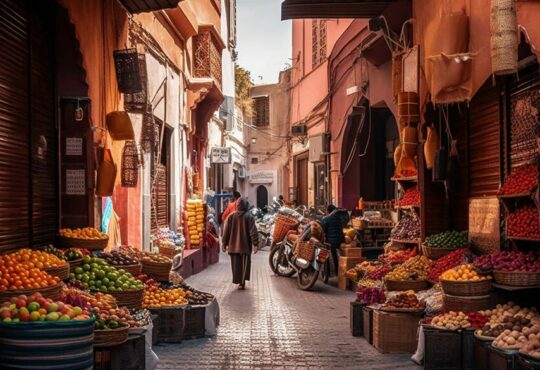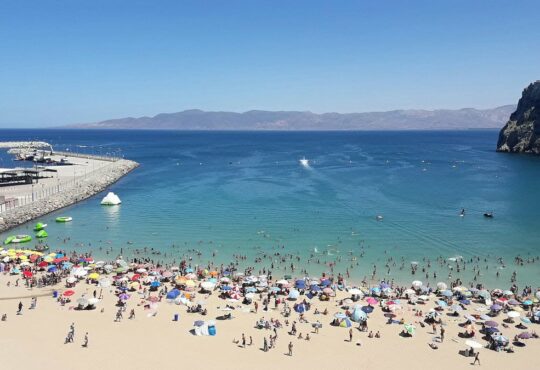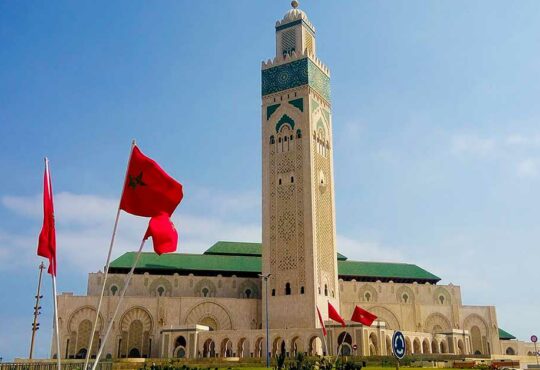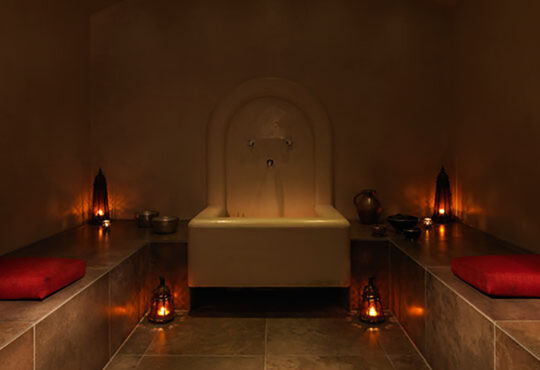2.3K
You may be wondering what languages are spoken in Morocco. Well, Arabic is the official language of Morocco, but Spanish and French are also commonly spoken. In some areas, you may even hear Berber or Tamazight.
If you’re planning on traveling to Morocco, it’s a good idea to learn a few phrases in Arabic or French to make things easier for you. Luckily, there are plenty of resources available online to help you do just that!
One of our favorite resources we recommend to travelers learning Moroccan Arabic is the Lonely Planet Moroccan Arabic Travel Phrasebook.
But before let’s take a closer look at the languages spoken in Morocco!
The reality is that Morocco is a widely diverse linguistic society where there are several language influences.
A sign with multiple languages in Morocco
This article will discuss the major languages spoken in Morocco and also include some language-learning tips and helpful phrases to help you get by on your next visit to Morocco.
The languages spoken in Morocco are Darija (Moroccan Arabic), Standard Arabic, French, Amazighiya (Berber languages), Spanish, and English.
Due to its strategic geographical location, Morocco has been ruled by several world powers over the ages. However, the oldest records reveal that the Amazigh or Berbers were the oldest and earliest inhabitants of Morocco. Their history goes as far back as 3000 BCE.
Whether there were other ethnic groups in Morocco at this time is not known but the only surviving ethnic group today is the Amazigh.
The Muslim conquest of North Africa reached Morocco in the 7th century CE. This was the beginning of a major religious, cultural and linguistic transformation that would result in Arabic becoming the dominant linguistic force, not only in Morocco but across the region.
Moroccan Arabic is different from other language varieties of Arabic for several reasons. Firstly, most Arabic-speaking countries are almost exclusively monolingual countries, meaning that everyone speaks Arabic and it has been like this for centuries.
A taxi sign in Morocco written in French and Arabic (Darija)
Morocco, on the other hand, is characterized as a multicultural, multilingual environment, probably the most diverse environment to be found in the greater Arabic-speaking region.
The land of Morocco has been ruled and occupied by different African, Arab, and European powers. Therefore, Moroccan Arabic or Derija also bears traces of the Amazigh languages, Latin, French, and Spanish.
The word Darija in Arabic means ‘common’ and ‘known’ and is used to describe the variety of Arabic that is spoken in Morocco today. Darija is also the name used for other language varieties in the region like Algerian Arabic. However, in this article, the term Darija is used specifically for the Moroccan Darija.
Darija can be regarded as the most used language in Morocco. Since Darija is not a written language, its grammar and structure are not clearly uniform throughout the country.
In addition, Darija has little to no official language status in Morocco, despite it being the mother tongue and lingua franca of the majority of Moroccan people.
Darija is also extremely loved and cherished by Moroccan people, who consider it a unique part of their culture and national identity.
While Arabic, is spoken all over the world, Darija is only spoken by Moroccans. Furthermore, other Arabic speakers have difficulty understanding Moroccan Darija Arabic due to its unique morphology and pronunciation.
Thus, what we loosely refer to as Darija is the combination of mutually intelligible languages or varieties that extend across the length and breadth of Morocco.
The Darija spoken in different regions is characterized by subtle differences in pronunciation and structure. One of the commonly known varieties of Darija in Morocco is the mainstream dialect which dominates major cities such as Casablanca and Rabat.
We also find other regional dialects like the ones spoken in Tangier and the one spoken in the Saraha region, called Hassania.
Morocco and the French language have had a long and difficult love-hate relationship.
The French invasion and attempted colonization of Morocco during the first half of the 20th century were met with tough resistance from day one. However, the French did manage to establish some institutions like education and healthcare.
These institutions were inherited by the Moroccan state after independence in 1956 and French has remained part of the education system ever since.
A mosque entry sign written in French
French has also made its way into government institutions and businesses.
French is still taught as an obligatory language in all schools. In 2010, there were 10,366,000 French speakers in Morocco, making up about 32% of the population.
In recent years, many have argued for the abandonment of French in favor of English, which has become the default world language. However, Morocco still has a long way to go towards promoting English as a major language.
English is becoming more popular in Morocco for many reasons. In major cities like Casablanca and Marrakech, you can find English-medium private schools and language centers. English is also becoming more important in the higher education sector, especially for people who plan to live and work outside Morocco.
A welcome sign written in English
At the moment, English has no official status in Morocco and is not prioritized in the public school system.
However, there are currently two ideas about the future role of English in Morocco. The first idea is that English should be incorporated into the schooling system as a third language, after Arabic and French. This is already happening in some sectors of Morocco.
The second, more radical approach is that English, being the number 1 global language and the default language of trade and education across the world, should replace French completely. This idea is supported by evidence that French does not have the scope and international reach of English.
- Origins: The Berber languages in Morocco date back to 3000 BCE
- Official status: Amazighiya is recognized as an official language in Morocco (even though it is really a family of languages)
The Amazigh family of languages is very interesting historically and linguistically because they are among the oldest languages in Africa.
A small rock painted with the Amazighi flag
Today, the Amazigh has spread across North Africa, even as far as Egypt. Still, their stronghold is the Northwest corridor of The Atlas Mountains in Morocco. The largest number of Native Amazigh speakers in the world are still alive and well here.
There are three main dialects or linguistic varieties of Amazigh in Morocco: Rif or Tarifit, Tachelhit, and Tamazight. Tarifit is spoken in the North, around the region of the Rif Mountains. Tamazight is spoken in the central Atlas region. Tachelhit is spoken in the Sous region.
The Amazigh languages were originally written using the Tifinagh alphabet, but have become commonly written using Arabic and more recently the Latin scripts.
For all intents and purposes, Standard Arabic is the official language of Morocco. It is the language of basic and higher education, the courts, religious ceremonies, and business. Standard Arabic has the highest official status in Morocco, according to the constitution. Therefore, it is the default language used in all formal domains.
An entry door sign written in Arabic, French and English
Yes, you can totally learn Standard Arabic in Morocco. In fact, going to study standard Arabic in Morocco may be a great ‘2 for the price of 1’ deal. Take a course in standard Arabic in Morocco and you will, in so doing, be able to learn Moroccan Darija for free, while interacting with the locals and traveling through the highs and lows of Morocco.
While Morocco is not as well-known for being a center of learning as it is for being a tourist attraction, there are Arabic learning programs available for language learners. Therefore, since Standard Arabic is the language of education in Morocco, it is just as good a place as any other to learn Arabic, not to mention the amazing food.
Morocco is undoubtedly one of the most linguistically and culturally diverse nations in North Africa and the greater region. There are several languages spoken in Morocco including Standard Arabic, French, Darija, and Amazigh languages. The indigenous Amazigh languages are given official status, unlike in other neighboring countries.
Finally, Morocco would be a great place to learn Arabic, whether standard-form or Darija, and you will certainly have a lot of fun in the process.





